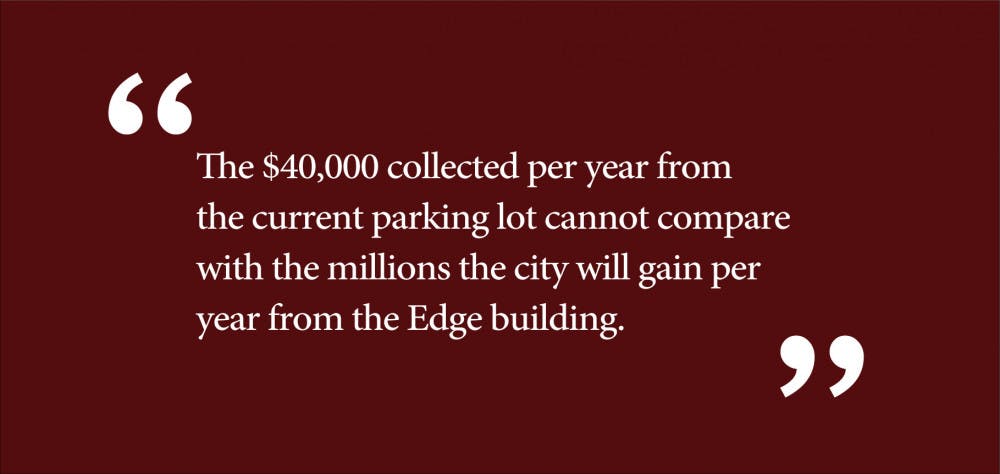If you’re a sophomore or a junior, you’re probably already in the process of looking for a place to live next year. The current state of apartment hunting in Providence is reminiscent of the recruiting cycle — it happens earlier and earlier every year, and chances are that all of your friends signed last week. It’s time for you to pick up the pieces, but all of your options are overpriced and involve walls with peeling paint. Luckily, there is Edge College Hill II, that new luxury apartment tower going up near the Rhode Island School of Design — if you’re breaking the bank on this apartment, it might as well be worth it, right? Well, according to multiple prominent local advocacy groups, two city councilors-elect and an incumbent city councilwoman, by doing so, you would be implicated in a morally degenerate operation that prioritizes rich students over low-income residents. Wow, having principles sucks sometimes, doesn’t it? Guess the stuffy, reclaimed attic unit with no windows just won your housing lottery, whether you like it or not.
Forgive my sarcasm, but I believe the scenario I described is somewhat accurate. Student housing is a perennial problem for multiple parties — the University, the City of Providence, community groups and, of course, students. For the University (specifically, the Office of Residential Life), student housing is a lose-lose situation. The University is required to provide housing, yet doing so is unprofitable and a frequent point of criticism — taking the proverbial dump on ResLife has been a rite of passage for Herald opinions writers for a while. The City of Providence attempts to balance multiple interests, such as providing affordable housing as dictated by its Comprehensive Plan, providing legal housing for students, promoting investment in the city and making money from taxes. It’s hard to satisfy one interest without compromising another. Community groups, namely Direct Action for Rights and Equality, want city funds to be repurposed for low-income housing. And students want a nice place to live that doesn’t break the bank. The city, whose regulations determine what actually happens, is stuck between a rock and a hard place, and its decision to provide Edge College Hill’s developers a tax break does not deserve the criticism it has received.
The Providence City Council recently approved a tax agreement that saves the developer of the 163-unit apartment building $19 million over 20 years. Evidently, the city council decided to solve the city investment, student housing and tax revenue problems at the expense of the affordable housing one. Its logic makes sense. According to City Council Majority Leader, John Igliozzi, the building’s tax revenue — even with the tax agreement — far exceeds the $40,000 per year the city was receiving from the parking lot currently there. In all seriousness, the developers would likely not have constructed Edge College Hill II without a tax incentive. Given the alternatives the city faced — likely, overcrowded student housing or new Brown and RISD student housing buildings that are exempt from property taxes — the City Council’s decision doesn’t seem so bad. If anything, the Edge apartments may siphon business from the 257 Thayer complex and similar offerings in the area, lowering the overall price for student housing by introducing competitive new supply. The city clearly has a lot to gain from the deal.
What the city has to lose is its reputation, which is currently being challenged by DARE. In a letter written to the City Council after the tax agreement vote, DARE criticized the city for diverting funds from public works (such as repairs to roadways and schools, recreational programs) and negotiating a bad deal with the developers, and instead suggests that City Council implement “real” affordable housing, inclusionary zoning laws and local hiring. This criticism is flawed because it is near-sighted. First of all, by negotiating a deal with the developers, the city acquired a new source of revenue that it will then be able to repurpose for public works. The $40,000 collected per year from the current parking lot — though it may not “take resources away from our communities” — cannot compare with the millions the city will gain per year from the Edge building. Why have less money when you can have more? It’s not like this approach to development in the city is without precedent: The Providence Place Mall is still reaping the benefits of a 30-year property tax abatement negotiated after its construction. It seems that a 20-year agreement is simply the going rate.
On the other hand, the letter’s policy suggestions are compelling, and this building will probably introduce gentrification-related problems. The city currently does not have an inclusionary zoning clause in its zoning ordinance despite professing its commitment to affordable housing at multiple points in its current Comprehensive Plan. The building may also raise overall prices in the Canal Street area to a level that will price-out some existing residents, an equity issue that the city will have a tough time addressing. Either it will have to intervene through rent control or public housing — both of which fail often since landlords and the government have little financial incentive to maintain their properties, and public housing often isolates its residents financially and socially. Though nonprofit intervention could also remediate the problem, the city has little control over deciding whether an altruist ultimately intervenes. Providence may not have the right answer here, but I don’t think any U.S. city does either.
In short, the city is doing the best it can with the tools at its disposal. Though the current solution isn’t perfect, it is the best one out a short list of options. Students should not have to feel bad about themselves for choosing to live in Edge, and the city should not feel bad for allowing it to happen either.
Andrew Friedman ’19 can be reached at andrew_friedman@brown.edu. Please send responses to this opinion to letters@browndailyherald.com and op-eds to opinions@browndailyherald.com.





